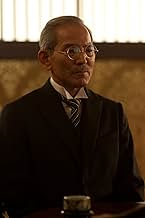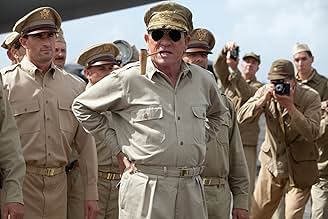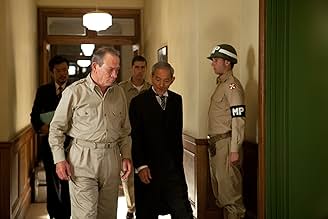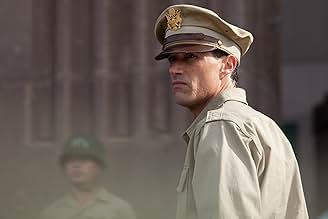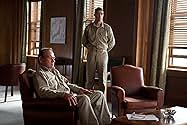Füge eine Handlung in deiner Sprache hinzuAs the Japanese surrender at the end of World War II, General Fellers is tasked with deciding if Emperor Hirohito will be hanged as a war criminal. Influencing his ruling is his quest to fin... Alles lesenAs the Japanese surrender at the end of World War II, General Fellers is tasked with deciding if Emperor Hirohito will be hanged as a war criminal. Influencing his ruling is his quest to find Aya, an exchange student he met years earlier in the U.S.As the Japanese surrender at the end of World War II, General Fellers is tasked with deciding if Emperor Hirohito will be hanged as a war criminal. Influencing his ruling is his quest to find Aya, an exchange student he met years earlier in the U.S.
- Regie
- Drehbuch
- Hauptbesetzung
- Auszeichnungen
- 1 Nominierung insgesamt
Empfohlene Bewertungen
In 1945, General Douglas MacArthur was made Supreme Commander in American- occupied Japan and one of his first and most momentous decisions was whether or not to execute Emperor Hirohito as a war criminal. For most Americans, there was no debate: Hirohito was the man who endorsed the infamous attack on Pearl Harbor. But, whether or not he backed the war, a case could be made that he was crucially instrumental in bringing about the peace by ordering the Japanese to surrender. Furthermore the hanging of the emperor - still revered by most Japanese as a deity - could well lead to an explosion of violence that would make the occupation by the Americans and the revival of the shattered nation immensely more difficult.
MacArthur commissioned Brigadier General Bonner Fellers to make a study of the emperor's complicity and make a recommendation on execution. Fellers was someone who knew the Japanese well and had considerable respect for their ancient culture. Indeed, before the war, he had fallen in love with a Japanese woman studying in the United States and, even after the war, was anxious to see her again.
This amazing story is told respectfully by British director Peter Webber and writers Brazilian Vera Blasi and American David Klass, drawing on Shiro Okamoto's book "His Majesty's Salvation", in a film that even-handedly represents Japanese perspectives of the time. The acting is first-rate with Matthew Fox (best-known for the TV series "Lost") giving a sensitive performance as Fellers and Tommy Lee Jones perfectly cast as the swaggering MacArthur. Many excellent Japanese actors contribute, notably the lovely Eriko Hatsune as Fellers' girlfriend. Shot on locations in both New Zealand and Japan, high production values make this an admirable viewing experience.
The movie lacks the fast-paced action that many expect from a visit to the cinema and arguably it is overly sympathetic to the Japanese position and somewhat saccharine in its treatment of the romance, but it is a real pleasure to see a work that tells a little- known story of such consequence so well.
While Tommy Lee Jones relishes in playing every Tommy Lee Jones character ever (stealing all the best lines in the process) as the hard-nosed but cunning General MacArthur, Fox delivers a more grounded and arresting performance as Bonner Fellers, a man torn between his moral obligations and his duty to the army, and to an American public crying out for blood.
Director Peter Webber infuses a romantic subplot with Fellers' Japanese girlfriend Aya (Eriko Hatsune) neatly, filling a role but never interjecting into a story that, quite frankly, is underscored by the power of men post-war. When MacArthur finally comes face-to-face with the Emperor after an excruciating build-up, the scene's emotional force and intense interplay perfectly resonate the best attributes of this vastly underrated drama.
*There's nothing I love more than a bit of feedback, good or bad. So drop me a line on jnatsis@iprimus.com.au and let me know what you thought of my review. If you're looking for a writer for your movie website or other publication, I'd also love to hear from you.*
It was not clear at the beginning of this film whether it was a true story or a story based around true events. If the fact that it was a true story had been made clearer, it would have been more compelling. Nonetheless, it did capture most of the turbulent elements of that time. The love affair, that parallels this story is a good one and one that exposes the prejudice that existed against any Japanese woman who dared marry outside her culture. Eriko Hatsune was perfect in the role of an intelligent woman caught between tradition and emotion. Unfortunately, Matthew Foxx (General Bonner Fellers) acted as if he had been hit by a tranquilizer dart. Tommy Lee Jones overacted the role of MacArthur and was equally unconvincing.
Be warned. This is not an action movie,though a few action scenes exist. This is mainly a movie based on philosophic discussions, psychology, and cultural misunderstandings. Still, it offers a good view of an important time in world history.
This is a good drama war with emotion , suspense , thrills , culture clashes , and historical events . The picture contains a marvelous story of love and understanding set amidst the tensions and uncertainties of the days immediately following the Japanese surrender at the end of World War II. Excellent cast gives good acting as Fox who plays Bonner Fellers, a general who's sent to Japan to decide if Emperor Hirohito will be hanged for war crimes ; starring alongside him is Eriko Hatsune as Aya Shimada, a woman Fellers romanced years earlier, and Tommy Lee Jones as legendary Us military figure General Douglas MacArthur. The movie displays a colorful as well as adequate photography by Stuart Dryburgh . Emotive and evocative musical score by Alex Heffes . The flick was professionally directed by Peter Webber (Hannibal , The girl with a pearl earring). This true life story was one worthy of big-screen treatment .
The picture is well based on true events , these are the followings : After the war, Fellers played a major role in the occupation of Japan. Among his duties was liaison between HQ and the Imperial Household. Soon after occupation began, General Fellers wrote several influential memoranda concerning why it would be advantageous for the occupation, reconstruction of Japan, and U.S. long range interests to keep the Emperor in place if he was not clearly responsible for war crimes. He met with the major defendants of the Tokyo tribunal. In their research and analysis of events and considerable controversy about the time period, according to historians Herbert Bix and John W. Dower, Fellers—under an assignment by the code name "Operation Blacklist"—allowed them to coordinate their stories to exonerate Emperor Hirohito and all members of his family. This was at the direction of MacArthur, now head of SCAP, who had decided that there was to be no criminal prosecution of the Emperor and his family. He will question the accused Class -A War Criminals such as Wartime Prime Minister Hideki Tojo, Former Prime Minister Konoe, and Koichi Kido while confronting prejudice from a resentful populace and other American soldiers. General Fellers, who came from a Religious Society of Friends family (commonly known as Quakers) and attended the Quaker-affiliated Earlham College, was instrumental in the selection of Elizabeth Vining, an American Quaker educator, as tutor to the Emperor's children. Ms. Vining was followed after 4 years by another Quaker educator, Esther Rhoads.In 1971, Emperor Hirohito conferred on Fellers the Second Order of the Sacred Treasure "in recognition of your long-standing contribution to promoting friendship between Japan and the United States."
Tommy Lee Jones is plainly having lots of fun as the blustering larger- than-life Douglas MacArthur, and Matthew Fox delivers a good performance with moments of extreme intensity. Masayoshi Haneda plays a translator and aide and manages to pull off a role that has dignity despite the harrowed and dishevelled appearance of the character. Eriko Hatsune - the love interest of the film - has a fragile beauty but is too reserved throughout the movie to deliver much of an emotional impact. The film was shot in New Zealand and Japan (in fact it's the first movie to film inside the Japanese Imperial Palace) and it's gorgeous - the ruins of bombed out Tokyo are especially impressive, and of course the Imperial Palace as a backdrop is fascinating.
The quibble I had with the movie is that it tries to create a sense of urgency and suspense, but since it's based on historical events it largely fails. Anyone who has taken history in high school should know how it turned out. With the exception of a couple of scenes, there also isn't much of an emotionally charged drama going on either. Although I enjoyed it, I cannot deny that it moved at a more sedate pace and lacked great urgency and suspense.
Wusstest du schon
- WissenswertesThe romantic story between Fellers and Aya was entirely fictional for the film. Bonner F. Fellers was married in 1925 to Dorothy Dysart who accompanied him twice on his posting to the Phillipines, and she also went with him to China and Japan.
- PatzerIn the opening sequence the film makers use archival film showing an atom bomb being loaded into the bomb bay a B-29 for the attack on Hiroshima. The bomb shown is "Fat Man" and not "Little Boy" that was used on the attack on Hiroshima (8-6-1945). "Fat Man" was used in the second attack, three days later (8-9-1945) on Nagasaki.
- Zitate
General Douglas MacArthur: I don't want the Communists in here. But Washington wants vengance on the emperor, because their voters do, and their voters have no fucking idea what's good for them.
Top-Auswahl
- How long is Emperor?Powered by Alexa
Details
- Erscheinungsdatum
- Herkunftsländer
- Offizielle Standorte
- Sprachen
- Auch bekannt als
- Emperor
- Drehorte
- Produktionsfirmen
- Weitere beteiligte Unternehmen bei IMDbPro anzeigen
Box Office
- Bruttoertrag in den USA und Kanada
- 3.346.265 $
- Eröffnungswochenende in den USA und in Kanada
- 1.014.099 $
- 10. März 2013
- Weltweiter Bruttoertrag
- 14.858.240 $
- Laufzeit1 Stunde 47 Minuten
- Farbe
- Sound-Mix
- Seitenverhältnis
- 2.35 : 1
Zu dieser Seite beitragen









